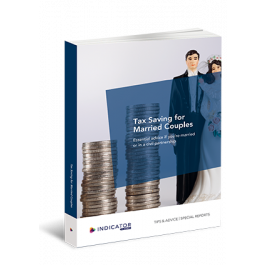Tax Saving for Married Couples
Essential advice if you’re married or in a civil partnership
A Tips & Advice Special Report about...
In a nutshell
This Special Report considers the tax-saving strategies for married couples and those in civil partnerships. It explains how these strategies work and offers advice on putting them into practice to cut income tax, capital gains tax and inheritance tax bills.
In detail
Independent taxation for married couples was introduced in 1990. It brought new tax planning opportunities but also a tougher approach from HMRC to tax avoidance. This Special Report describes how couples can save tax and NI through legitimate use of the general tax system and the special rules that apply to them. It explains:
- How to successfully split business income to reduce tax and NI
- Which methods work best for various business structures
- How to transfer unearned income to maximise tax savings
- The capital gains tax pros and cons of transferring assets
- The new capital gains tax rules for separating couples
- Simple estate and inheritance tax planning
We've created this Tips & Advice Special Report especially for...
Everyone who’s married or in a civil partnership and wants to:
- Get the most out of the special tax rules that apply
Advisors that want to:
- Provide their clients with the best possible tax-saving advice
You'll get the following free extras with this Tips & Advice Special Report...
An online service with ready-to-use documents
- To immediately apply our advice and solutions in practice
- That you can easily adapt to suit your own requirements
In this Tips & Advice Special Report you'll read about...
Table of contents
1. General tax issues for married couples and civil partners
1.1. Who counts as married or in a civil partnership for tax purposes?
1.2. Does marriage affect all taxes equally?
1.3. Does HMRC have special rules for common law spouses or partners?
1.4. How are transactions between spouses/civil partners treated for tax purposes?
2. Business income
2.1. Can I split business income with my spouse/civil partner to reduce tax on profits?
2.2. Can all business income be split?
2.3. What about sole traders?
2.4. In what circumstances can I pay a spouse/civil partner as an employee?
2.5. Can I pay my spouse/civil partner below the minimum wage?
2.6. Can I pay my spouse for ad hoc work?
2.7. Where I employ my spouse/civil partner what’s the tax treatment of benefits in kind?
2.8. Is there an advantage to paying my spouse as a freelance worker?
3. Partnerships
3.1. I’m a sole trader; can I create a partnership with my spouse/civil partner?
3.2. How do I create a partnership?
3.3. How does HMRC view business partnerships between spouses/civil partners?
3.4. In what circumstances can HMRC attack a tax-saving partnership?
4. Companies
4.1. Does my company have to pay the national minimum/living wage to my spouse/civil partner?
4.2. How much can my spouse/civil partner be paid for being a director?
4.3. How does paying my spouse/civil partner from my company save tax?
4.4. Can I give some of my shares to my spouse/civil partner to improve tax efficiency?
4.5. Can my company pay different rates of dividend to my spouse/civil partner?
4.6. What are the pros and cons of dividend waivers?
4.7. What are the pros and cons of creating different classes of share?
5. Other tax planning for business-related income
5.1. When is it possible to provide benefits in kind to a spouse/civil partner?
5.2. Can my business provide tax and NI-free or efficient benefits in kind to my spouse/civil partner?
5.3. Are some benefits more tax efficient than others?
5.4. Are there circumstances where a benefit in kind is not tax or NI efficient?
6. Unearned income and tax reliefs and allowances
6.1. What types of unearned income can be split and how should it be done?
6.2. What’s the special rule for taxing joint income for married couples and civil partners?
6.3. Does the 50% rule apply in every situation?
6.4. How is a Form 17 election made?
6.5. How can I use a Form 17?
6.6. How can I change or reverse a Form 17 election?
6.7. How might tax allowances and reliefs be used for tax planning?
6.8. What is the marriage allowance and how can I claim it?
7. Capital gains tax
7.1. What’s the general CGT rule for transactions between an individual and their spouse/civil partner?
7.2. Can I reduce CGT using my spouse/civil partner’s CGT losses?
7.3. How can intra-spouse/civil partner transactions be used to avoid the “bed and breakfast rules”?
7.4. How does private residence relief work for married couples and civil partners?
7.5. What’s the tax position if one spouse/civil partner transfers assets to the other in the year of marriage or separation?
7.6. Can a transfer of a share of the family home by a separated spouse ever be exempt from CGT?
8. Inheritance tax
8.1. What are the general rules for transfers between individuals for IHT purposes?
8.2. What’s the general IHT rule for transactions between an individual and their spouse/civil partner?
8.3. What’s the IHT position if a couple separate or divorce?
8.4. What are IHT transferrable nil rate bands?
8.5. Is there any IHT planning possible with TNRBs?
9. Stamp duty land tax, land and buildings transaction tax and land transaction tax
9.1. Are transfers of land and buildings between spouses/civil partners liable to SDLT etc.?
9.2. In what circumstances does the exemption apply?
10. Children
10.1. Can I transfer income-producing assets to my children to save tax?
10.2. What’s the tax position if my child makes a capital gain from an asset I gave them?
10.3. What’s the IHT position on gifts to my minor child?
11. Appendices
11.1. Appendix 1 - UK tax rates and rate bands
11.2. Appendix 2 - PAYE tax and NI rules for casual work
11.3. Appendix 3 - Partnership Act 1890 - sections 1-3
11.4. Appendix 4 - Tax and NI-free benefits in kind and employment expenses
11.5. Appendix 5 - Assets within the scope of capital gains tax
You can choose from the following options...
Paper
- The hard copy version
- Keep it on your desk or use it whenever you're offline
Digital
- The PDF-version
- Delivered to your inbox
Take a look at your options below.
Special subscribers' offer
£90.00
£70.00
Only if you already have a subscriptionStandard offer
£90.00
Special subscribers' offer
£90.00
£70.00
Only if you already have a subscriptionStandard offer
£90.00

Got a question? Call Customer Services
(01233) 653500


 (01233) 653500
(01233) 653500 







